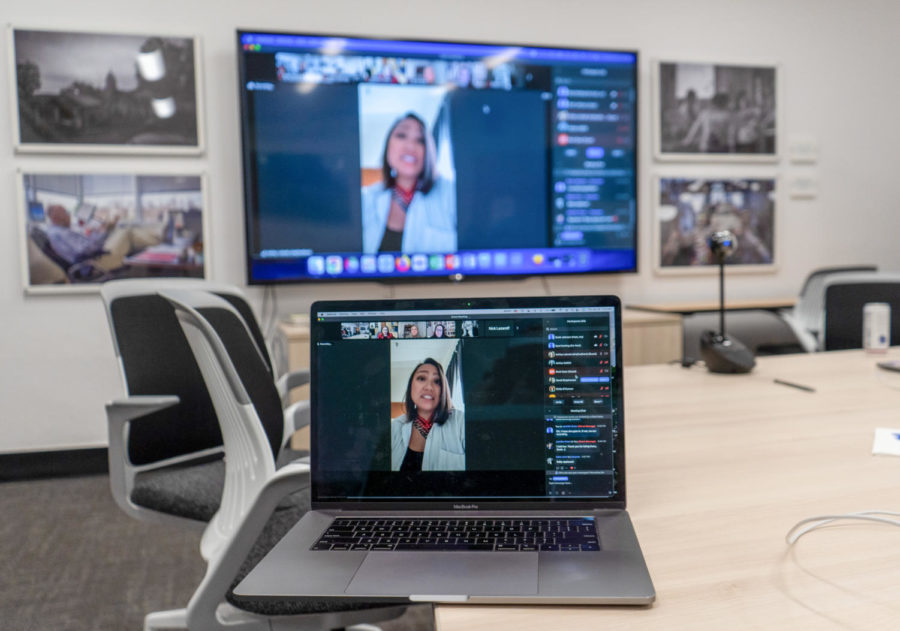‘Your career is never direct.’ UK alumnus shares experiences reporting in Ukraine, Philippines
UK alumna Ashley Westerman speaks via a Zoom livestream about her experience as a freelance journalist and her time covering Ukraine on Thursday, Jan. 26, 2023, at McVey Hall in Lexington, Kentucky. Students, faculty and guests watch through the Zoom link and ask questions toward the end. Photo by Carter Skaggs | Staff
January 30, 2023
UK students and faculty heard from School of Journalism and Media alumnus Ashley Westerman via Zoom about her experience covering the war between Ukraine and Russia, on Thursday, Jan. 26.
Westerman is a freelance journalist and audio producer currently located in the Philippines. She graduated from UK with degrees in journalism and political science in 2010 and moved to Washington, D.C., immediately after. She worked for National Public Radio before moving to Louisiana to work for a smaller newsroom.
Westerman experienced culture shock moving from D.C. to Baton Rouge. She said going from a newsroom of 1,000 to a newsroom of six often felt lonely, but she learned everything she knows today from that local station.
“I know that some of your dreams aren’t to start out in a tiny station,” Westerman said. “But when you’re forced to do everything … it teaches you so much. I learned how to be a journalist there.”
Westerman moved to Ukraine in April 2022, two months after the war began. She worked as the field producer and co-host of the podcast “Ukraine Stories” by Fearless Media.
While living in Ukraine, Westerman noticed the United States’ coverage of the war began to diminish despite the continued severity.
“It’s hard when you see the (war) you’re covering fade in the headlines,” Westerman said.
Westerman said weakened coverage resulted in many Americans being critical towards decisions to send military equipment to Ukraine, because they did not see the reality of life during the war.
Westerman wasn’t on the frontlines, but she said the danger still affected her greatly. When Russia began attacking Ukrainian infrastructure, she often experienced blackouts and water loss. A missile once hit less than one kilometer from where she was working.
Westerman shared a few tips for continuing coverage of the war despite major publications waning. She recommended looking into Ukrainian news sources and finding the media that covers the daily effects.
Interpreters were essential to Westerman while in Ukraine and continue to be while in the Philippines. She reflected on the importance of treating interpreters well and giving credit where credit is due.
“Depending on ( interpreters) is essential, but you should also respect them and pay them well,” Westerman said. “It tells them that you value their time and their skills. You have to give them credit where you can.”
She connected this importance to diversity, equity and inclusion in the newsroom, saying that interpreters can give a new perspective to stories.
Westerman discussed her heavy support of diversity and how she makes sure to be inclusive.
If she realizes her latest sources haven’t been diverse, she’ll ask contacts for a more diverse source to insure inclusivity.
“If you take the chance, you’ll be surprised that people are willing to help you out,” Westerman said.
Westerman ended by reflecting on the importance of journalists covering the topics that mean something to them. As an Asian American woman, she said she felt passionately about Asian American Pacific Islander rights and covering the issues surrounding it, but there’s a stigma regarding people of color covering stories about those of the same race.
The Asian American community was shaken by the mass shooting in Monterey Park, California, that took place on Jan. 21. Westerman said other Asian American people have every right to cover that story and shouldn’t be denied out of fear of bias.
Covering the issues that she feels passionately about is what led Westerman back to her home country in the Philippines. She said she wouldn’t be the journalist that she is today if it wasn’t for covering the topics important to her.
“The best person for the job is who should be doing the job,” she said. “Diversity only makes our journalism better.”




























































































































































Betty Ford McClain • Jan 30, 2023 at 5:23 pm
Very well written and interesting article.